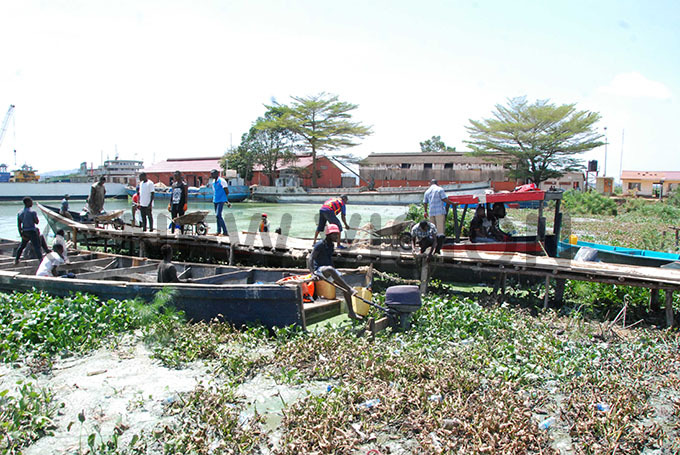Egypt extends more support to Uganda to fight aquatic weeds
Despite efforts to eliminate water hyacinth and salvinia molesta (Kaliba) weeds, on the lakes and rivers, the ministry admits that the task remained enormous.
ENVIRONMENT
The Ministry of Agriculture, Animal Husbandry and Fisheries has received more support from the Egyptian Water Directorate to fight aquatic weeds on Lake Victoria, Albert, and Kyoga.
Despite efforts to eliminate water hyacinth and salvinia molesta (Kaliba) weeds, on the lakes and rivers, the ministry admits that the task remained enormous.
Acting commissioner fisheries resources management, Dr Edward Rukuuya, told a delegation from Egyptian Water Directorate at Namalere Mechanization Centre in Wakiso district that Uganda still needed support to secure its water bodies from the giant water weeds.
Over 900Kms on Lake Victoria, were under siege by the hyacinth, while salvania molesta invaded most landing sites on Lake Albert and Kyoga, Rukuuya revealed.
In 1997, the hyacinth covered 90% of the lake shores in Uganda according to Rukuuya, but it has since been fought and reduced to about 20%.
Salvinia molesta has been described by experts as worse than the water hyacinth. The fast-growing aquatic weed is characterized by forming dense mats, brown, yellow or green in colour that affect fish and fishermen.

He said the weed first attacked the two lakes in 2013 and it was different from the water hyacinth and a bit hard to control. "It demanded different technologies to fight,"
The cooperation between Uganda and Egyptian in the fight against aquatic weeds extended as far back as the 1990s.
The Egyptians through the Uganda-Egypt Aquatic Weed Control Project supported the fight against water hyacinth on the lakes and rivers until the project phased out about two years ago.
The project phase out, resulted into the resurge of the hyacinth, covering most of the landing sites on Lake Victoria including Port Bell early this year prompting an outcry from fishing communities.
Rukuuya, however, revealed that both governments were in talks on the possibility of reviving the project.
The Egyptians have also been engaged in the fight against salvania molesta since 2015. In 2015 they offered to research and study the weed for possible interventions to eliminate it.
For the last one year, Rukuuya said the Egyptians have been involved in piloting a project where they engaged fishermen and local communities on Lake Albert and Kyoga into manual removal of Kaliba weed from the lakes to utilize it for local processing of biogas.
"This project was intended to examine ways we can go through to eliminate this weed. They donated biogas units to the communities to support the cause," he said.
"They were operating on only two landing sites of Wanseko on Lake Albert and Bugondo on Lake Kyoga.
But today they have handed us more biogas units and other tools to expand the project to other landing sites.
The support is essential because we need to rescue over 30 landing sites within a short time," Rukuuya added.
At a meeting with Minister of Agriculture, Vincent Ssempijja, at Protea Hotel in Kampala, the delegation led by the head of Egyptian central department for bilateral cooperation for Nile Basin countries, Dr.Hassan Mohammed, lauded the cooperation of the two countries in the fight against aquatic weeds and pledging continued support.
Ssempijja who commended the Egyptians for the support in the fight against both weeds assured them that government won't relent on ensuring the elimination of the weeds on lakes and rivers.
The agriculture ministry through National Agricultural Research Organization (NARO) is involved in breeding biological control insects, cytobagas salvinae (beetles) at Namulonge National Crops Resources Research Institute (NACRRI) to eat the weed as a permanent measure against the weed.
The minister disclosed that the machines the Egyptians used through the Uganda-Egypt Aquatic Weed Control Project to remove the water hyacinth before their contract expired, have been repaired. He disclosed that the process of training local engineers to operate the machines was ongoing.